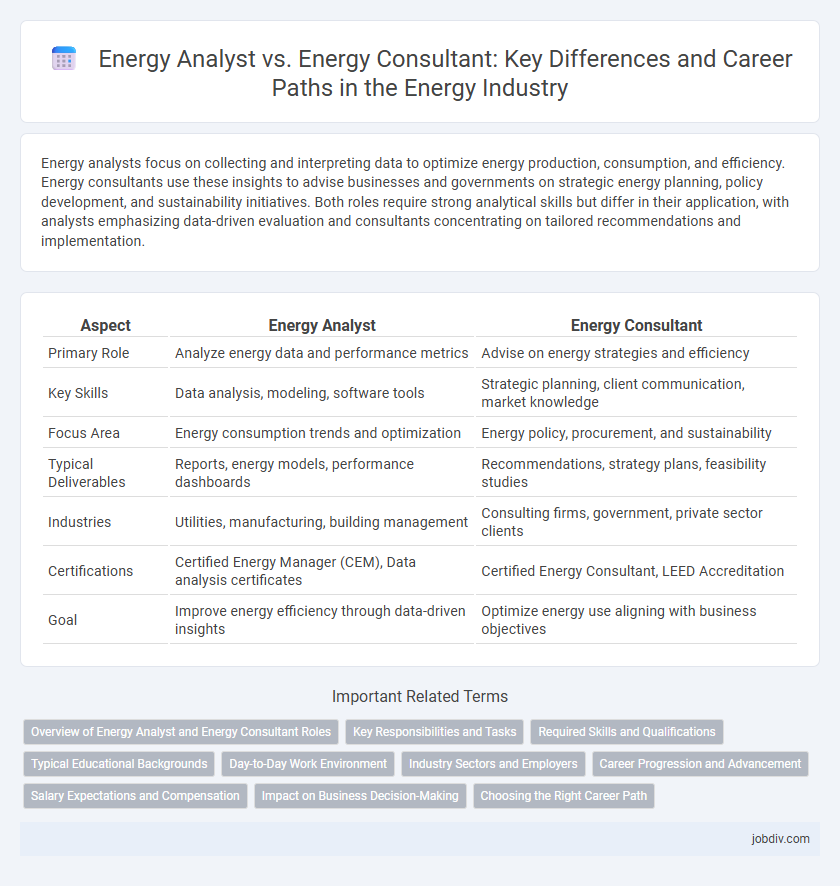Energy analysts focus on collecting and interpreting data to optimize energy production, consumption, and efficiency. Energy consultants use these insights to advise businesses and governments on strategic energy planning, policy development, and sustainability initiatives. Both roles require strong analytical skills but differ in their application, with analysts emphasizing data-driven evaluation and consultants concentrating on tailored recommendations and implementation.
Table of Comparison
| Aspect | Energy Analyst | Energy Consultant |
|---|---|---|
| Primary Role | Analyze energy data and performance metrics | Advise on energy strategies and efficiency |
| Key Skills | Data analysis, modeling, software tools | Strategic planning, client communication, market knowledge |
| Focus Area | Energy consumption trends and optimization | Energy policy, procurement, and sustainability |
| Typical Deliverables | Reports, energy models, performance dashboards | Recommendations, strategy plans, feasibility studies |
| Industries | Utilities, manufacturing, building management | Consulting firms, government, private sector clients |
| Certifications | Certified Energy Manager (CEM), Data analysis certificates | Certified Energy Consultant, LEED Accreditation |
| Goal | Improve energy efficiency through data-driven insights | Optimize energy use aligning with business objectives |
Overview of Energy Analyst and Energy Consultant Roles
Energy Analysts specialize in interpreting complex energy data to identify trends and optimize usage, leveraging tools such as energy modeling software and statistical analysis. Energy Consultants provide strategic advice to organizations on energy efficiency improvements, sustainability initiatives, and regulatory compliance, often tailoring solutions to client-specific needs. Both roles contribute to reducing energy costs and environmental impact but differ in their focus on data analysis versus actionable strategic planning.
Key Responsibilities and Tasks
Energy Analysts primarily focus on data collection, statistical analysis, and modeling to evaluate energy usage patterns and forecast trends, enabling informed decision-making for efficiency improvements. Energy Consultants engage in strategic advising, policy development, and project management, helping clients implement sustainable energy solutions and comply with regulatory standards. Both roles require expertise in energy markets, but Analysts emphasize quantitative assessment while Consultants prioritize client-focused strategy and implementation.
Required Skills and Qualifications
Energy Analysts require strong analytical skills, proficiency in data modeling, and expertise in energy market trends, often holding degrees in engineering, environmental science, or economics. Energy Consultants need advanced problem-solving abilities, communication skills for stakeholder engagement, and extensive knowledge of energy policy and regulatory frameworks, typically backed by professional certifications or graduate-level education. Both roles demand proficiency in software tools such as MATLAB, Python, or energy simulation platforms to assess energy systems effectively.
Typical Educational Backgrounds
Energy analysts typically hold degrees in engineering, environmental science, economics, or data analytics, equipping them with strong quantitative and technical skills to evaluate energy consumption patterns and market trends. Energy consultants often possess backgrounds in business, environmental policy, or sustainability studies, focusing on strategic advisory roles that integrate technical knowledge with client-specific energy management solutions. Both roles benefit from advanced certifications such as Certified Energy Manager (CEM) or Professional Energy Manager (PEM) to enhance industry credibility and expertise.
Day-to-Day Work Environment
Energy Analysts primarily focus on data collection, analyzing energy consumption patterns, and forecasting energy needs using statistical tools and software in office or lab settings. Energy Consultants engage directly with clients, offering strategic recommendations on energy efficiency, sustainability initiatives, and regulatory compliance while often visiting sites for audits and assessments. Both roles require strong analytical skills, but Energy Consultants experience a more dynamic work environment involving fieldwork and client interaction.
Industry Sectors and Employers
Energy Analysts primarily work within utility companies, government agencies, and research institutions analyzing market trends, consumption data, and policy impacts to optimize energy production and distribution. Energy Consultants serve a diverse range of industry sectors including manufacturing, construction, and renewable energy firms, advising on strategic energy management, regulatory compliance, and sustainability initiatives. Employers for Energy Analysts often include public utilities and federal energy departments, whereas Energy Consultants are frequently employed by consulting firms, engineering companies, and private corporations focused on energy efficiency and environmental impact reduction.
Career Progression and Advancement
Energy Analysts primarily focus on data interpretation, market trends, and efficiency improvements, serving as a foundation for entry to mid-level career stages in the energy sector. Energy Consultants leverage advanced expertise to provide strategic advice, manage projects, and influence energy policies, positioning themselves for senior roles and leadership opportunities. Career progression often involves transitioning from analytical roles to advisory positions, where strategic decision-making and client management skills drive professional advancement.
Salary Expectations and Compensation
Energy Analysts typically earn salaries ranging from $60,000 to $90,000 annually, with compensation influenced by experience, industry, and location. Energy Consultants often command higher salaries, averaging between $80,000 and $120,000, due to their advisory roles and client-facing responsibilities. Bonuses and profit-sharing opportunities further enhance compensation packages, particularly for Energy Consultants working with large firms or specialized markets.
Impact on Business Decision-Making
Energy Analysts provide data-driven insights by evaluating consumption patterns, forecasting trends, and identifying cost-saving opportunities, enabling businesses to optimize energy efficiency and reduce operational expenses. Energy Consultants leverage these insights alongside regulatory knowledge and market dynamics to develop strategic recommendations that align with corporate sustainability goals and compliance requirements. This collaborative impact enhances informed decision-making, driving long-term value and competitive advantage in energy management.
Choosing the Right Career Path
Energy Analysts specialize in data interpretation and market trend evaluation to optimize energy usage and cost efficiency, relying heavily on quantitative skills and software tools. Energy Consultants focus on advising clients on energy solutions, regulatory compliance, and sustainability strategies, requiring strong communication skills and industry expertise. Choosing between these careers depends on whether one prefers analytical roles with technical data or client-facing positions emphasizing strategic guidance.
Energy Analyst vs Energy Consultant Infographic

 jobdiv.com
jobdiv.com